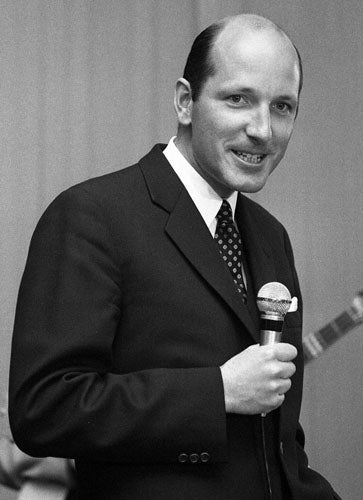Klaus Jacobs: Chocolate and coffee billionaire who put his fortune to work supporting young people round the world

Your support helps us to tell the story
From reproductive rights to climate change to Big Tech, The Independent is on the ground when the story is developing. Whether it's investigating the financials of Elon Musk's pro-Trump PAC or producing our latest documentary, 'The A Word', which shines a light on the American women fighting for reproductive rights, we know how important it is to parse out the facts from the messaging.
At such a critical moment in US history, we need reporters on the ground. Your donation allows us to keep sending journalists to speak to both sides of the story.
The Independent is trusted by Americans across the entire political spectrum. And unlike many other quality news outlets, we choose not to lock Americans out of our reporting and analysis with paywalls. We believe quality journalism should be available to everyone, paid for by those who can afford it.
Your support makes all the difference.Klaus Jacobs was a German businessman whose talent for founding, running and acquiring businesses helped him amass an extensive fortune as one of the most important figures in the world's coffee and chocolate trades.
Having built up a personal worth of more than 1bn euros [£798m], he proceeded to give much of it away when he reached his sixties, mostly in the form of donations to a youth fund and to a university. He subscribed, he explained, to a saying of Victor Hugo: "As the purse is emptied, the heart is filled." His name will live on in the Jacobs Foundation and in the Jacobs University in his home city of Bremen.
He had a marked international aspect, trading in many countries and becoming a Swiss citizen. He took up residence in the UK where, a keen horseman, he owned a Hertfordshire stud with almost a hundred mares.
Born in 1936 and educated inGermany and Stanford University in California, he was destined froman early age to work for the family coffee business, Joh. Jacobs & Company, which his father had greatly expanded. By the time he joined the company in 1962 he had already acquired some businesses of his own. Within a few years he was in charge, taking over from his father in 1969 and stepping up the pace of expansion by moving into Switzerland, France, Denmark and Canada.
He moved the company's base to Switzerland. By 1970, mergers and acquisitions in Spain, Belgium and the United States had established his concerns as the largest chocolate and coffee seller in Europe, and at various times he controlled companies and brands such as Barry Callebaut, Jacques Vabre, Van Houten, Jacobs-Suchard, Salmaza and Tobler, makers of Toblerone. He was, however, unsuccessful in an attempt to take over Rowntree.
Eventually the Philip Morrisconglomerate bought much of his businesses in a multi-billion dollar dealin 1990. Jacobs did hold on to some parts of his companies, remaining a major figure in the chocolate and coffeebusiness. He also built up a separate business by combining the Frenchand Swiss companies into Adecco, which emerged as a world leader inproviding temporary staff employment. He became embroiled in boardroom battles within Adecco, at one stagestepping down from the board, though he was president between 1995 and 2006.
In the employment business he took a particular interest in young people, which he carried over into his philanthropy. He argued: "We have to cope with a growing number of young people in the developing world who are increasingly excluded from participating in the creation of value and wealth. The widening gap between rich and poor, between literate and non-literate young people, has all the makings for major conflicts of the kind we see in so many parts of the world."
This concern led him to set up the Jacobs Foundation in 1988, with the stated aim of "supporting the development of professional and social skills of young people around the world." He poured millions into the organisation.
In 2001 he went further by arranging large-scale monies for the struggling International University inBremen, which was subsequently renamed in his honour. Its mission statement was "to prepare graduates forinternational leadership and global citizenship."
Such financing was something of a novelty in Germany, where private funding for colleges was regarded as unusual. The university now has 1,200 students, describing itself as a global village since only a quarter of these come from Germany. Another quarter are Asian. An American academic this week described Jacobs as "an inspiring and visionary leader who helped to blaze a new path in international higher education."
Jacobs later made his biggest ever donation. He announced that he and his family had agreed to hand over the bulk of its fortune to his Foundation, declaring: "As a family, we strongly believe in entrepreneurial values. But we also no less firmly endorse the principle of sharing."
His contributions also includeddonations to the World Scout Foundation, in which he took a keen interest, and to the world of music, in particular the Zurich Opera House, where he was a regular visitor. He enjoyed the music of Wagner. Although he was a UK resident he died at his home near Zurich.
David McKittrick
Klaus Jacobs, businessman: born Bremen, Germany 3 December 1936; married twice (six children); died Küsnacht, Switzerland 11 September 2008.
Join our commenting forum
Join thought-provoking conversations, follow other Independent readers and see their replies
Comments